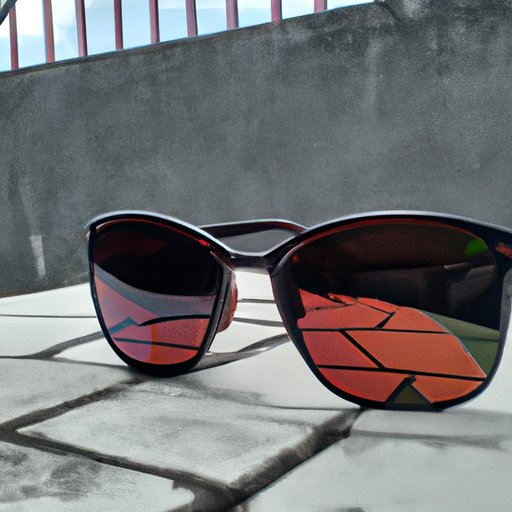Introduction
Eye health is an important part of overall health, yet many people do not take steps to protect their vision. From ultraviolet (UV) radiation exposure to eating unhealthy foods and not exercising enough, there are various factors that can impact eye health and lead to long-term vision problems. By understanding the risks and taking preventative measures, you can help keep your eyes healthy and ensure your vision remains sharp for years to come.

Wear Sunglasses When Outside to Protect Against UV Radiation
One of the best ways to protect your eyes is to wear sunglasses when you go outside. Sunlight contains both visible and invisible light, including UV radiation, which can damage the eyes and increase the risk of developing certain eye conditions. According to the American Academy of Ophthalmology (AAO), “Exposure to UV radiation without protection can contribute to cataracts, macular degeneration and other eye diseases.”
When selecting sunglasses, look for ones with 100 percent UV protection and wraparound frames to block out as much sunlight as possible. Additionally, polarized lenses can help reduce glare and make it easier to see in bright light.
Eat a Healthy Diet Full of Fruits and Vegetables
Eating a balanced diet is essential for overall health, and it can also help maintain eye health. Fruits and vegetables contain essential vitamins and minerals that help protect and nourish the eyes, such as vitamin C, vitamin E, lutein, and zeaxanthin. Research published in the journal Nutrition Reviews found that these nutrients “help protect against age-related macular degeneration, cataract formation, and other retinal disorders.”
For optimal eye health, aim to eat a variety of colorful fruits and vegetables every day. Some specific examples include leafy greens, bell peppers, carrots, sweet potatoes, oranges, strawberries, and blueberries.

Get Regular Checkups With an Ophthalmologist
Having regular checkups with an ophthalmologist is important for detecting any potential issues with your eyes. An ophthalmologist is a medical doctor who specializes in diagnosing and treating eye diseases and other eye-related conditions. During a checkup, they will examine your eyes to look for signs of disease or other problems and provide recommendations on how to protect your vision.
If you’re at an increased risk of developing eye conditions due to family history or other factors, it’s even more important to get regular checkups. The earlier any issues are detected, the better chance you have of preventing further damage to your eyes.

Exercise Regularly to Help Improve Vision
Regular exercise is essential for maintaining good health, and it can also help improve vision. Exercise helps increase blood flow to the eyes, which can help reduce pressure in the eyes and improve oxygen levels. This can help reduce the risk of developing glaucoma and other eye conditions.
Any type of aerobic activity is beneficial for eye health, but some specific exercises that can help improve vision include walking, jogging, biking, swimming, and yoga. Aim to exercise for at least 30 minutes a day, five days a week for optimal results.
Reduce Stress Levels
Stress can have a significant impact on physical and mental health, and it can also affect eye health. Studies have found that chronic stress increases inflammation in the body, which can lead to dry eyes, blurred vision, and other eye-related problems. Therefore, it’s important to take steps to reduce stress levels and manage your emotions.
There are a number of ways to reduce stress, such as practicing mindfulness, talking to a therapist, getting enough sleep, and engaging in activities that bring you joy. Find what works best for you and make sure to incorporate stress-relieving activities into your daily routine.
Avoid Smoking and Secondhand Smoke
Smoking is bad for your health in general, and it can also have a damaging effect on your eyes. Studies have found that smoking increases the risk of developing cataracts, macular degeneration, and other eye-related conditions. Additionally, secondhand smoke can cause irritation and redness in the eyes.
If you currently smoke, quitting is the best way to protect your vision. Talk to your doctor about methods for quitting and consider joining a support group to help you stay motivated. Additionally, avoid being exposed to secondhand smoke whenever possible.
Take Breaks From Screens and Work on Distant Objects to Reduce Eye Strain
Spending too much time looking at screens can cause eye strain, which can lead to headaches, blurry vision, and other issues. To reduce eye strain, try the 20-20-20 rule: Every 20 minutes, look away from your screen and focus on something 20 feet away for 20 seconds. Additionally, take regular breaks away from screens throughout the day.
You can also work on distant objects, such as crossword puzzles or coloring books, to give your eyes a break. Working on distant objects can help improve focusing ability and reduce fatigue in the eyes.
Conclusion
Eye health is an important part of overall health, and there are a number of steps you can take to protect your vision. Wear sunglasses when outside, eat a healthy diet full of fruits and vegetables, get regular checkups with an ophthalmologist, exercise regularly, reduce stress levels, avoid smoking and secondhand smoke, and take breaks from screens to reduce eye strain. By following these tips, you can help keep your eyes healthy and enjoy clear, sharp vision for years to come.
(Note: Is this article not meeting your expectations? Do you have knowledge or insights to share? Unlock new opportunities and expand your reach by joining our authors team. Click Registration to join us and share your expertise with our readers.)
